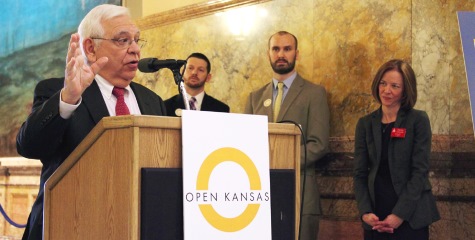
Effort aimed at increasing access to records, boosting citizen participation
by Jim McLean, KHI News Service
Several nonprofit organizations that advocate for children, minorities and low-income Kansans are concerned about what they see as a trend toward less open government in Kansas.
So, they’ve joined forces to launch what they’re calling the Open Kansas initiative and to ask legislators to sign a “transparency pledge” to taxpayers. The pledge commits those who sign it to support:
• Public and transparent processes.
• Timely and reasonable access to public information.
• Increased public participation.
“It’s become more and more challenging for Kansans to access public information and to participate in our democracy,” said Benet Magnuson, executive director of Kansas Appleseed.
Asked for an example, Shannon Cotsoradis, president and chief executive of Kansas Action for Children, cited problems that her organization had getting timely information about the status of ongoing payments Kansas receives from the nation’s leading tobacco companies under a 1998 agreement that settled a multi-state lawsuit.
The information KAC sought from Attorney General Derek Schmidt was important, Cotsoradis said, because the state uses the tobacco settlement to fund children’s programs.
In recent years, Cotsoradis said, the failure of some executive branch agencies and legislative committees to provide ample notice of meetings also has become an issue.
Senate Minority Leader Anthony Hensely said the process used to cobble together last year’s budget is another example of what he agrees is a growing problem. Hensley, a Topeka Democrat, said that when legislators voted on the final budget bill few knew it included a provision that lifted the cap on how much the Kansas Department of Transportation could borrow.
“That’s an egregious example of what’s going on up here,” Hensley said.
Doug Anstaett, executive director of the Kansas Press Association, said the rising cost of obtaining public records is making them less accessible to journalists and the public.
“The outrageous charges being levied by public agencies are effectively closing records because nobody can afford them,” Anstaett said. “It’s so costly, it’s as if they said ‘no’ in the first place.”
The Topeka Capital-Journal’s request in December for staff emails from the Kansas Department for Children and Families is a recent example. The newspaper asked for emails exchanged among six DCF staff members over a two-day period. The agency charged the newspaper $2,885, most of which was for the cost of having a staff attorney review the emails prior to their release.
The Kansas Press Association and other members of the Kansas Sunshine Coalition (http://kssunshine.us/) are working on legislation to standardize what public agencies charge for fulfilling open record requests. Coalition members also are backing bills that would designate the private emails and texts sent by government officials that deal with public business as public records and do the same for video recorded by law enforcement officers on dashboard and body cameras.
Rep. John Rubin, a Republican from Shawnee, was one of two legislators invited to sign the transparency pledge at Wednesday’s kickoff ceremony at the Statehouse.
Describing himself as a strong supporter of “open, transparent and accountable government,” Rubin said he was committed to continuing his efforts to increase the public’s access to government records and the political process.
“We are a state and a nation founded on the principle that we are a government of the people, by the people and for the people,” Rubin said. “And for the life of me, I don’t understand how we can be that kind of government if we hide from the people what we are doing.”
Rubin has angered GOP leaders by challenging rules that allow several bills to be bundled together for bulk votes. He says the practice makes it harder for lawmakers and the public to know what’s being decided.
In 2014, Rubin successfully pushed for passage of legislation to open law enforcement records used to obtain search and arrest warrants. He took on the issue after reading about a Johnson County couple’s efforts to obtain a copy of the sealed probable cause affidavit that authorized sheriff’s officers to search their home for what turned out to be nonexistent drugs.
This session, Rubin is among the co-sponsors of House Bill 2148, which would require the live streaming of audio from legislative committee meetings.
Rep. John Wilson, a Lawrence Democrat, said he won’t sign pledges that “box people in” and limit their ability to deal with changing circumstances. But he joined Rubin in signing the transparency pledge.
“We can all see this pledge up here, we know what it says,” Wilson said, nodding to a poster-size version of the pledge near the podium. “This is an elemental concept that can’t box somebody in, because it’s something we should all feel proud to stand up for and support. So, I hope that we are the first two of 125 state representatives and 40 senators that sign this pledge.”
Organizers of the transparency initiative say they will post the names of lawmakers who sign the pledge to the Open Kansas website at http://www.openkansas.org/. But they say they have no immediate plans to track how legislators vote on transparency legislation or to issue report cards.
In addition to Kansas Appleseed and KAC, founding members of the initiative include El Centro, Communities Creating Opportunity and the Kansas Association of Community Action Programs.
The nonprofit KHI News Service is an editorially independent initiative of the Kansas Health Institute and a partner in the Heartland Health Monitor reporting collaboration. All stories and photos may be republished at no cost with proper attribution and a link back to KHI.org when a story is reposted online.
– See more at http://www.khi.org/news/article/nonprofit-groups-launch-open-government-initiative#sthash.YFGJOb7v.dpuf
